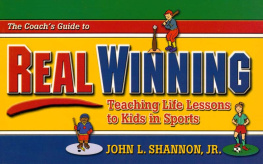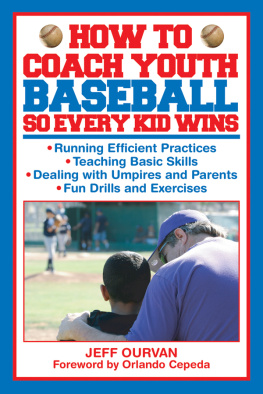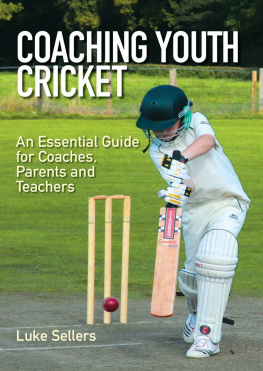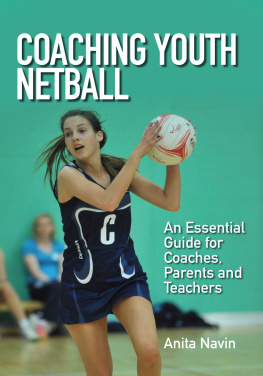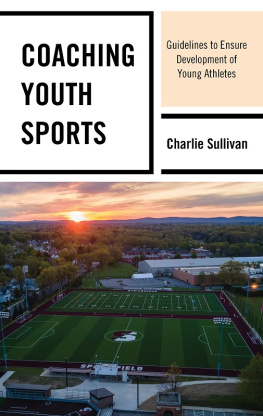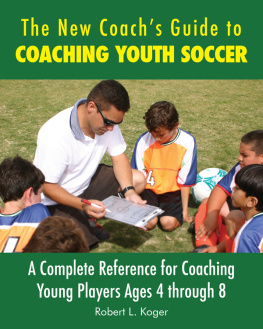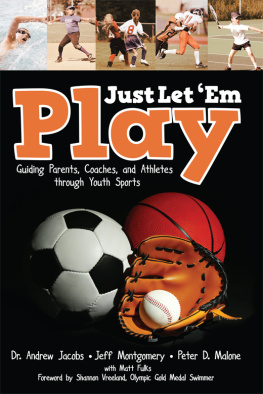Copyright 2001 by John L. Shannon, Jr. All rights reserved. No part of this publication may be reproduced, stored in a retrieval system, or transmitted in any form or by any means, electronic, mechanical, photocopied, recorded, or otherwise, without the prior written permission of the publisher. For information, write Addicus Books, Inc., P.O. Box 45327, Omaha, Nebraska 68145.
ISBN# 1-886039-56-9
Cover design by Peri Potoni
Ilustrations by Jack Kusler
Typography by Linda Dageforde
Library of Congress Cataloging-in-Publication Data
Shannon, John L., 1953
The coachs guide to real winning! : teaching life lessons to kids in sports / John L. Shannon, Jr.
p. cm.
An Addicus nonfiction book.
ISBN 1-886039-56-9 (alk. paper)
1. Sports for childrenCoaching. I. Title.
GV709.24 .S52 2000
796.V077dc21
2001001492
Addicus Books, Inc.
P.O. Box 45327
Omaha, Nebraska 68145
Web site: www.AddicusBooks.com
Printed in the United States of America
10 9 8 7 6 5 4 3 2 1
To my lovely bride Katy and to my three winning sons, Cory, Brady, and Case
Contents
Acknowledgments
I would like to express my gratitude and affection to Leo Goslin, my high school football and hockey coach. Coach Goslin taught me how much fun competition and hard work is. His influence is the single greatest reason why I pursued an undergraduate degree in secondary education with hopes of coaching high school sports.
I would also like to thank Jerry Noyce, my former coach of the University of Minnesota tennis team and Division I National Tennis Coach of the Year. Jerry built a tennis franchise in Minnesota by his leadership on and off the court, and I will always be indebted to him for giving me the opportunity to enjoy a perfect career.
I would be remiss if I did not acknowledge the finest teaching tennis professional in the country, Frank Voigt. I had the great pleasure of working with Frank for many years. Always the consummate gentleman, Frank treated everyone with dignity. And, he taught me the importance of learning how to teach each individual differently. Frank is no longer with us, but remains an indelible memory to all those whose lives he touched. One of my luckiest breaks in life was to work with this truly outstanding individual.
I am also grateful to the many wonderful men and women I have coached with throughout the years in community youth athletic programs. They are too numerous to list here, but I would like to mention Kevin Dulin, no one is more professional or prepared; Dick Lewis, no one is more committed; Kevin Johnson, no one is worthier of more respect; and Mark Heyne, who always has his heart in the right spot. I also thank Brad Cookie Carlson; no one created more fun or had more fun than he.
Finally, I must acknowledge my life coach, my father Jack. Always constant in purpose and deed, he has demonstrated integrity and service in every aspect of life, and positively affects everyone he meets. I am so proud to call him Dad.
Introduction
A man never stands as tall as when he kneels to help a child.
Knights of Pythagoras
Every year more than 4 million volunteer coaches work with over 40 million young athletes in the United States, according to the Positive Coaching Alliance. Many of these adults have never coached before, and certainly most have never received formal training in working with young children in an athletic setting. It is my hope that Real WinningTeaching Life Lessons to Kids in Sports-will serve as an inspirational guide for all the generous volunteer coaches in community athletic programs who work with children ages five to fifteen.
During the past thirty years, I have worked with many kids and experimented with different approaches to coaching. I have also observed many other coaches. Unfortunately, an increasing number of coaches today exhibit an unhealthy level of intensity that rivals college and professional levels of competition. These overzealous coaches berate players, officials, and other coaches. They also limit playing time to only the very best players in hopes of pulling in a big W.
Virtually every time I talk to these coaches about their teams, the conversation inevitably turns to their win/loss records. If they are winning, they light up with pride. If they are losing, they describe their players as weak or as having behavior problems. Some of these coaches approach the season with a win at any cost mind-set. Although some will have a winning season, they will also lose many players in the process. Rarely do I hear these coaches talk about the improvement of their teamsas players, as units, and as individuals.
Coaches must focus on lessons that go far beyond the field of competition. If we are to be truly winning coaches, we must help kids develop character and integrityqualities that will forever enrich their lives. This is real winning.
We coaches today are in a prime position to help our kids grow. Our influence on children is not fleeting. It lasts a lifetime.
They may forget what you said, but they will never forget how you made them feel.
Carl W. Buechner
Part I
What Winning Coaches Know
Children are the living messages we send to a time we will not see.
John W. Whitehead

Its about the kids!
A winning coach becomes involved in coaching because he or she loves to watch kids play and grow. He or she measures the success of a season not by the number of games won, but by the number of kids wonthose who are learning lessons that will make them winners in life. A winning coach knows that to help build winning kids, he or she must first win over every child on the team. Enthusiastically, a winning coach invests one of his or her most precious gifts, time, in our most precious asset, our children.
The child comes first, then the athlete, and then the sport.
A number of years ago, one of the parents of a boy on my hockey team asked me what my coaching priorities were. I had not given much thought to a question like this, so I didnt really have a prepared thought. But I thought for a moment and told her that my priorities were first, to assist in the development of a young person; second, to assist in the development of a young athlete; and lastly, to assist in the development of a young hockey player.
When I got home that evening, I wrote down a priority list on a piece of paper and put it in a new folder labeled Coaching. Through the years, I have added many thoughts to this folder. And each year I review it for my own benefit. In this whole collection of ideas, no one thought stands out to me more profoundly than my list of coaching priorities.
As coaches, we must remember this very simple priority: We are dealing with children first and foremost, then athletes and players. When we dont recall this fact, we risk ignoring the primary needs of the vast majority of the children with whom we work, children so urgently in need of our care and support.
Assist in the development of a young person.
Most of the children we work with in a season will not play the sport(s) we coach in high school, let alone in college or beyond. They will not be the stars of their teams. They will be kids who play for a few years and then move on to other interests. What, then, should be our first priority? Simple. Our first priority should be to assist in their development as people, with an emphasis on teaching them life lessons.
Next page
